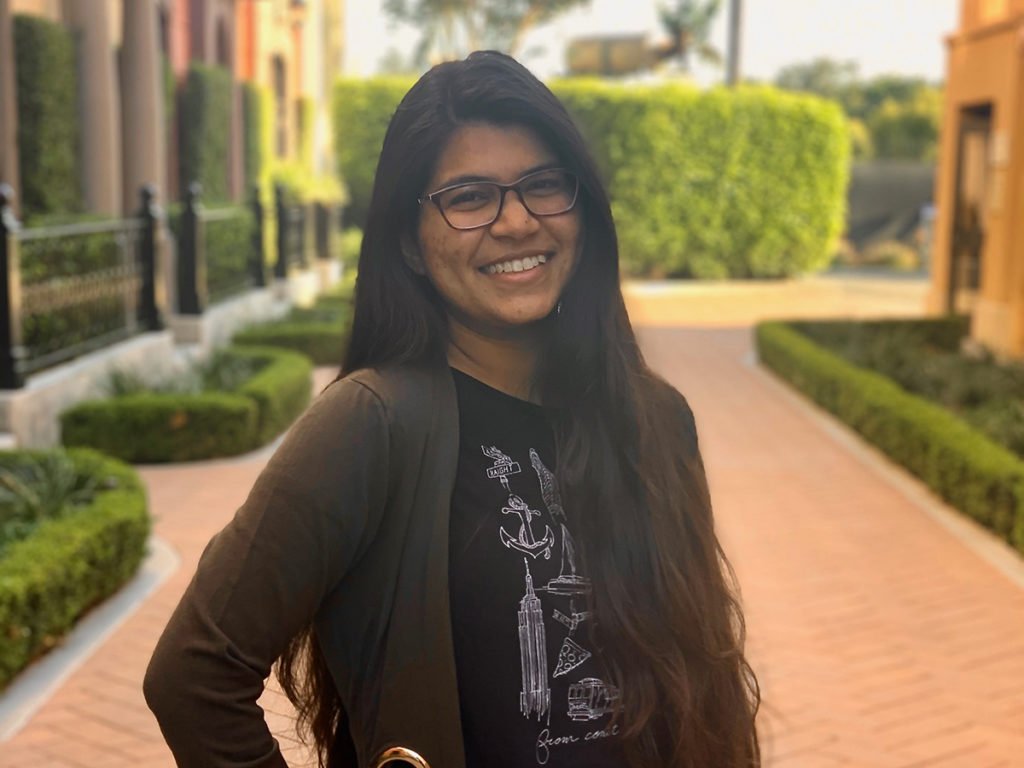Alumna Starts Nonprofit to Help Families in Bangladesh

By Daryl Paranada
Visual and Media Arts alumna Afsara Alvee ’19 recently co-founded a nonprofit organization called Kandari that helps to provide food to low-income families affected by COVID-19 in her home country of Bangladesh. Since launching, Kandari has helped more than 1,200 families affected by the pandemic.
Why did you want to start Kandari?
My parents taught me many valuable lessons and one of them was that you don’t need a lot of money to help others, all you need is courage. We didn’t have a lot, but my parents always tried to help others as much as they could. So I decided that I would open my own non-profit organization to help underprivileged people and be their voice.
When I heard that the World Health Organization declared COVID-19 as a global pandemic, I couldn’t stop thinking about my people. In the meantime, my mum and my brother tested positive for COVID-19. Even though my mum is a health worker and her job requires her to wear personal protective equipment, she still got sick. I had to act quickly, [like] there is no tomorrow. Things can change instantly, and for a country like Bangladesh, it was more likely to spread quickly and cause more harm. Thus, I started Kandari to help people who are not privileged.
How is the nonprofit helping people in Bangladesh?
Our very first project was “A Thought for Food,” which helped more than 1,200 middle-class and low-income families. We started with crowdfunding. As we received funds, we started preparing food each week for families. We initiated it in Dhaka, Bangladesh’s capital city, and then distributed food in other cities. On top of that, we also provided Iftar (the meal Muslim people have after breaking their fast) to around 4,000 people on the streets of Dhaka.
We targeted middle-class families because this is the section of the society that oftentimes gets neglected. With any sort of pandemic or disaster, most organizations focus on [low-income] or homeless [people]. Many times, they forget about those small business owners or people who make less than $20,000 a year. These families always feel shy to ask for help due to their social status. Thus, we decided to provide food to these families.
Describe how the nonprofit works.
I believe nonprofits should solely work for people and provide necessary resources to improve targeted people’s lives. This is what Kandari aims to do. We can provide food for a week, but what about the rest of [a person’s] life? Our vision is to find a permanent solution in the form of a resource or service that would provide people with a steady source of income to fulfill their basic needs for the rest of their life. Our goals are to end poverty and hunger, ensure quality education and social awareness, and spread positivity.
Kandari is also working on other projects, such as raising funds to rebuild a school recently destroyed by a cyclone and distributing meat to families in Bangladesh affected by COVID-19 for Eid-al-Fitr, a religious holiday celebrated by Muslims worldwide that marks the end of the fasting of Ramadan.
What is the meaning behind the name Kandari?
Kandari means “helmsman,” someone who would guide and work selflessly to reach a destination or a goal. We are a young group of people who want to hold the wheel to take Bangladesh to another platform in the world.
You successfully transitioned from an intern at Sony to post-production assistant. How has COVID-19 affected your work?
Sony was the best place to work. In fact, I didn’t just work there, I grew and learnt so much. After the lockdown, I got laid off right after studios shut down. We were hoping to get back to work soon after. Unfortunately, the situation wasn’t in our favor. Since everyone had to work from home, there was no need for an assistant.
How are you and your family coping with the pandemic?
My mother and brother both tested positive for COVID-19 in March. I was devastated. At that time, they were in Boston and I was in LA. Thanks to God, they recovered pretty quickly.
How are you getting through the pandemic?
Life doesn’t work the way we plan, but all we can do is be thankful for what we have. I feel so lost sometimes when I think what about what to do next, since I don’t have a job currently. Then I see students from the school in Bangladesh. They don’t know what they’ll eat for their next meal. With how privileged I am, it gives me hope.
Categories